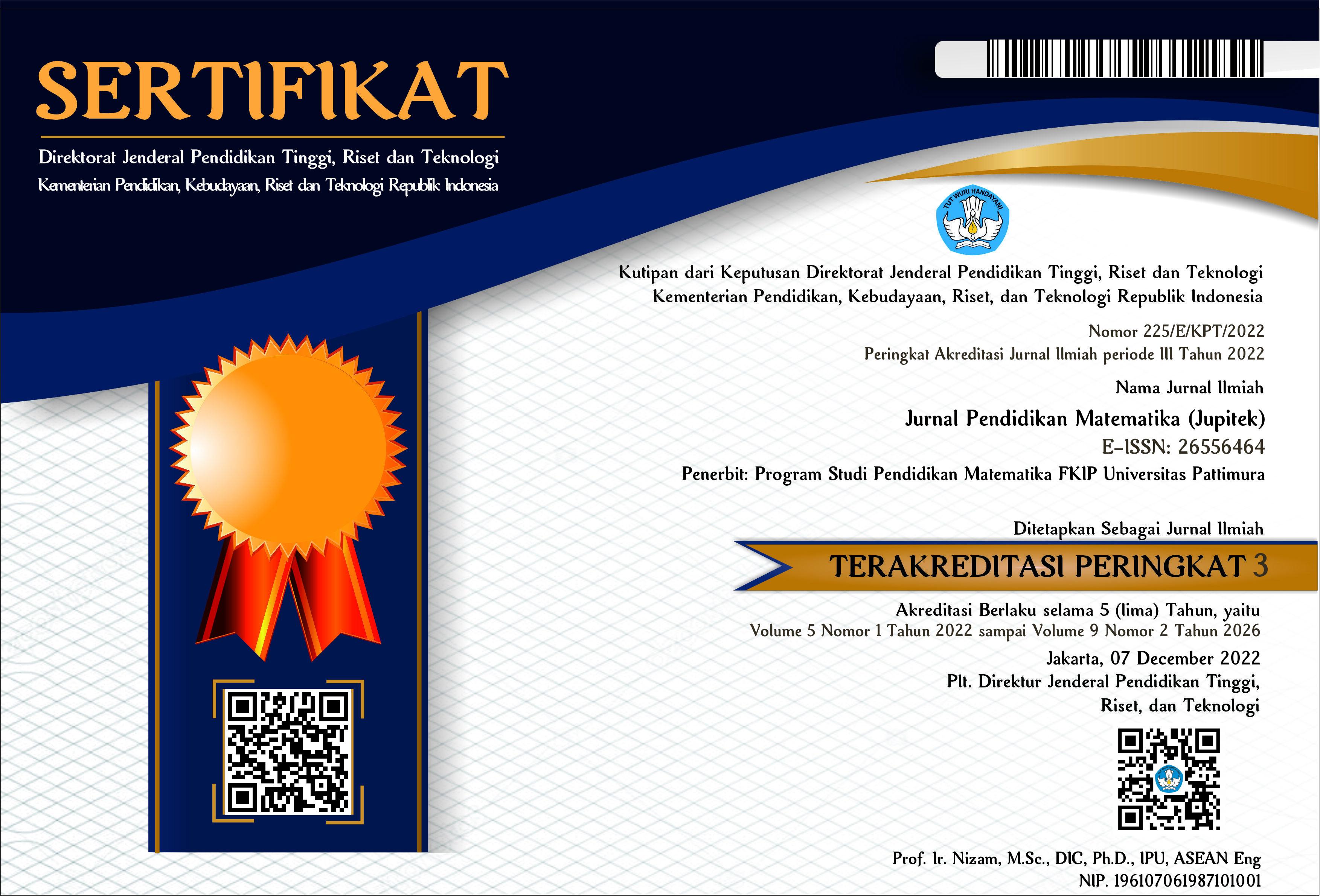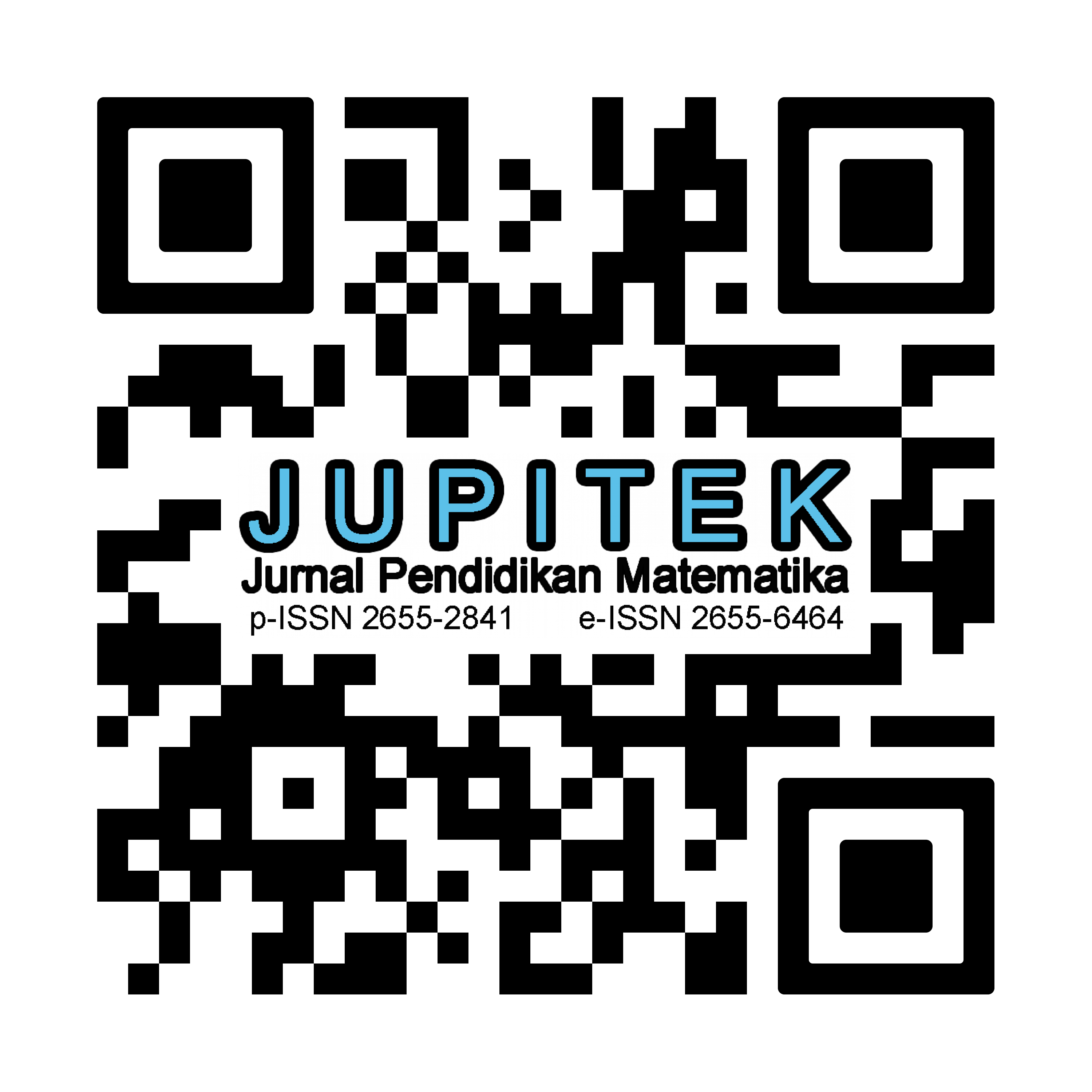PENGARUH MODEL PEMBELAJARAN EVERYDAY MATHEMATICS DAN GAYA KOGNITIF TERHADAP KEMAMPUAN BERPIKIR KRITIS SISWA SMA NEGERI 4 SELUMA BENGKULU
Abstract
This article explains the results of research on the influence of everyday mathematics learning models on critical thinking skills of Class XI students of SMA Negeri 4 Seluma in the 2019/2020 Academic Year. This type of research is experimental research with quasi experimental. This research was conducted at SMAN 4 Seluma in the odd semester of the 2019/2020 school year with a population of all class XI and sample classes XI MIA1, XI MIA2, XI MIA3, and XI IIS2. Research data were analyzed using Ancova test. The results showed that there were differences in critical thinking skills between students taught with everyday mathematics and conventional learning models after controlling students' initial abilities with p-value = 0.00 <0.05, there were differences in critical thinking between students whose cognitive styles were Field Independent (FI), and Field Dependent (FD) cognitive style after controlling students 'initial abilities with p-value = 0.00 <0.05, there is an influence of learning model interaction and cognitive style on critical thinking skills after controlling students' initial abilities with grades p-value = 0.00 <0.05, there is a linear influence of students 'initial covariate ability on critical thinking skills with p-value = 0.00 <0.05, students' initial ability, everyday mathematics learning model and cognitive style together - the same effect on critical thinking skills p-value = 0.00 <0.05
Downloads
References
AACU. 2010. Critical Thinking Value Rubric. Diakses pada tanggal 2 Juli 2019, dari: http://www.aacu.org/value/rubrics/pdf/criticalthinking.pdf
Abdullah, I. H. 2013. Berpikir Kritis Matematik. Jurnal Matematika Dan Pendidikan Matematika. Vol. 2, No. 1, April 2013
Anderson, T. Garrison, D. R. & Archer, W. 2004. Critical thinking, cognitive presence, computer conferencing in distance learning. [Online tersedia di: http.communityofinquiry.com/file/CogPres_Final.pdf [Diakses 7 juli 2019].
Carraher. D. W & Schliemann. A. D. 2002. is everyday mathematics truly relevant to mathematics education. Article in Journal for Research in Mathematics Education Monograph • January 2002
Desmita. 2009. Psikologi Perkembangan Peserta Didik. Bandung: PT Remaja Rosdakarya
Febriani, P., Widada, W., & Herawaty, D. (2019). Pengaruh Pembelajaran Matematika Realistik Berbasis Etnomatematika Terhadap Kemampuan Pemahaman Konsep Matematika Siswa SMA Kota Bengkulu. Jurnal Pendidikan Matematika Raflesia, https://ejournal.unib.ac.id/index.php/jpmr, 04(02), 120–135.
Idris, N. 2006. Teaching and Learning of Mathematics: Making Sense and Developing Cognitive Abilities. Kuala Lumpur: Maziza SDN. BHD.
Herawaty. D, Rusdi, & Efrida. E. 2016. Peningkatan Kemampuan Pemahaman Konsep Dan Kemampuan Pemecahan Masalah Melalui Penerapan Model Pembelajaran Berbasis Masalah, Matematika Realistik Dan Konflik Kognitif Siswa. Jambi: Artikel Dimuat Dalam Prosiding Jambi Internasional Seminar On Education 3-5 April 2016
Kasiram. M. 2008. Metodelogi Penelitian: Malang :UIN-Malang Press
Ma’Rifah. N & Widada. W. 2019. Pembelajaran TAI dengan Open Ended Problem untuk Meningkatkan Kemampuan Berpikir Kritis Mahasiswa Tadris Matematika IAIN Curup. Jurnal Pendidikan Matematika Raflesia Vol. 04 No. 01, Juni 2019
Ma’Rifah, N., & Widada, W. (2019). Pembelajaran TAI dengan Open Ended Problem untuk Meningkatkan Kemampuan Berpikir Kritis Mahasiswa Tadris Matematika IAIN Curup. Jurnal Pendidikan Matematika Raflesia, 4(1), 1–9. https://doi.org/10.33449/jpmr.v4i1.7523
Melisa, Widada, W., & Zamzaili. (2019). Pembelajaran Matematika Realistik Berbasis Etnomatematika Bengkulu untuk Meningkatkan Kognisi Matematis. Jurnal Pendidikan Matematika Raflesia, https://ejournal.unib.ac.id/index.php/jpmr, 04(02), 103–110.
Murphy, Lauren. 1999. Advancing Children’s Mathematical Thinking in Everyday Mathematics Classrooms (Journal for Research in Mathematics Education). NCTM
Nirwana. 2012. Pengaruh Manajemen Pembelajaran Berbasis Lingkungan Dan Gaya Kognitif Terhadap Hasil Belajar IPA-Fisika Di SMPN Kota Bengkulu (Studi eksperimen pada Siswa Kelas VII Semester I SMPN 11 Kota Bengkulu). Prosiding Seminar nasional Fisika 2014
Nurhaidah. 2013. Profil Proses Berpikir Siswa SMP Tentang Relasi Dan Fungsi Berwawasan Everyday Mathematics Yang Ditinjau Dari Aspek Gaya Kognitif FDI Dan Jenis Kelamin Siswa (Pada Kelas VIII C SMPN 11 Kota Bengkulu). Tesis : UNIB
Roan. C. 2012. a comparison of elementary mathematics achievement in everyday math and saxon math schools in illinois. Diakses pada tanggal 2 Juli 2019,dari: http://scholars.indstate.edu/bitstream/handle/10484/3991/Clayton%20Roan.pdf?sequence=2&isAllowed=y
Sari. M. E. 2016. Pengaruh Penerapan Pembelajaran Everyday Mathematics Terhadap Kemampuan BerpikirKreatif, Kemampuan Pemecahan Masalah Dan Kemampuan Komunikasi Matematika Pada Siswa SMP Negeri 2 Lubuk Linggau. Tesis : UNIB
Suwanto. 2019. Pengaruh Pendekatan Matematika Realistik Dan Gaya Kognitif Terhadap Kemampuan Pemahaman Matematika Dan Kemampuan Pemecahan Masalah Siswa SMP N 14 Bengkulu. Tesis UNIB.
Uno, H. B. (2007). Profesi Kependidikan. Jakarta: Bumi Aksara.
Usodo. B. 2011. Profil Intuisi Mahasiswa Dalam Memecahkan Masalah Matematika Ditinjau Dari Gaya Kognitif Field Dependent. Artikel. Prosiding Seminar Nasional Matematika Dan Pendidikan Matematika UNS
Pusvita, Y., Herawati, & Widada, W. (2019). Etnomatematika Kota Bengkulu : Eksplorasi Makanan Khas Kota Bengkulu “Bay Tat .†Jurnal Pendidikan Matematika Raflesia, https://ejournal.unib.ac.id/index.php/jpmr, 04(02), 185–193.
Widiarti, Y., Anggreni, D., & Sari, S. A. (2019). Identifikasi Etnomatematika Alat Musik Tradisional Bengkulu Sebagai Media dan Alat Peraga Dalam Penyampaian Konsep Lingkaran. Jurnal Pendidikan Matematika Raflesia, https://ejournal.unib.ac.id/index.php/jpmr, 04(02), 177–184.
Widada, W. 2011. Psikologi Kognitif Pendidikan Matematika. FKIP Universitas Bengkulu
Widada, W. 2016a. Profile of Cognitive Stucture of Students in Understanding the Concept of Real Analysis. Journal of Mathematics Education, 5(2), 83–98. https://doi.org/10.22460/infinity.v5i2.215
Widada, W. Dkk. 2018. Abstract Level Characteristics in SOLO Taxonomy during Ethnomathematics Learning. International Journal of Science and Research (IJSR). ISSN (Online): 2319-7064. Volume 7 Issue 8,
Widada, W. Dkk. 2018. The Scheme Characteristics for Students at the Level of Trans in Understanding Mathematics during Etnomathematics Learning. Advance in Social Science. Education and Humanities Research. Volume 253.
Zdravkovich, Vera. 2004. The Year of Critical Thinking Hand book of Critical Thinking Rasources. Maryland: Prince George’s Community College Faculty Members. Diakses pada tanggal 3 juli 2019. Dari: http://fadjar39.files.wordpress.com/2008/06/00-ausubel_limas_1.pdf
Copyright (c) 2020 Galih Ageng Pambudi, Wahyu Widada, Nirwana Nirwana, Dewi Herawaty

This work is licensed under a Creative Commons Attribution-NonCommercial-ShareAlike 4.0 International License.
License and Copyright Agreement
By submitting a manuscript to Jurnal Pendidikan Matematika (JUPITEK), the author(s) certify and agree to the following terms:
- Originality and Authority: The submitting author is authorized by all co-authors to enter into this agreement. The manuscript describes original work that has not been published previously in a peer-reviewed journal, nor is it under consideration for publication elsewhere.
- Approval: Its publication has been approved by all author(s) and by the responsible authorities of the institutions where the work was carried out.
- Rights: The authors secure the right to reproduce any material that has already been published or copyrighted elsewhere.
- Licensing and Copyright: Authors retain the copyright to their work.
- License Grant: The authors grant Jurnal Pendidikan Matematika (JUPITEK) the right of first publication, with the work simultaneously licensed under the Creative Commons Attribution-NonCommercial-ShareAlike 4.0 International (CC BY-NC-SA 4.0).
- Self-Archiving: Authors are permitted and encouraged to deposit the published version of their article in institutional repositories, on their personal websites, and other academic platforms, with proper acknowledgment of its initial publication in Jurnal Pendidikan Matematika (JUPITEK).






.png)


